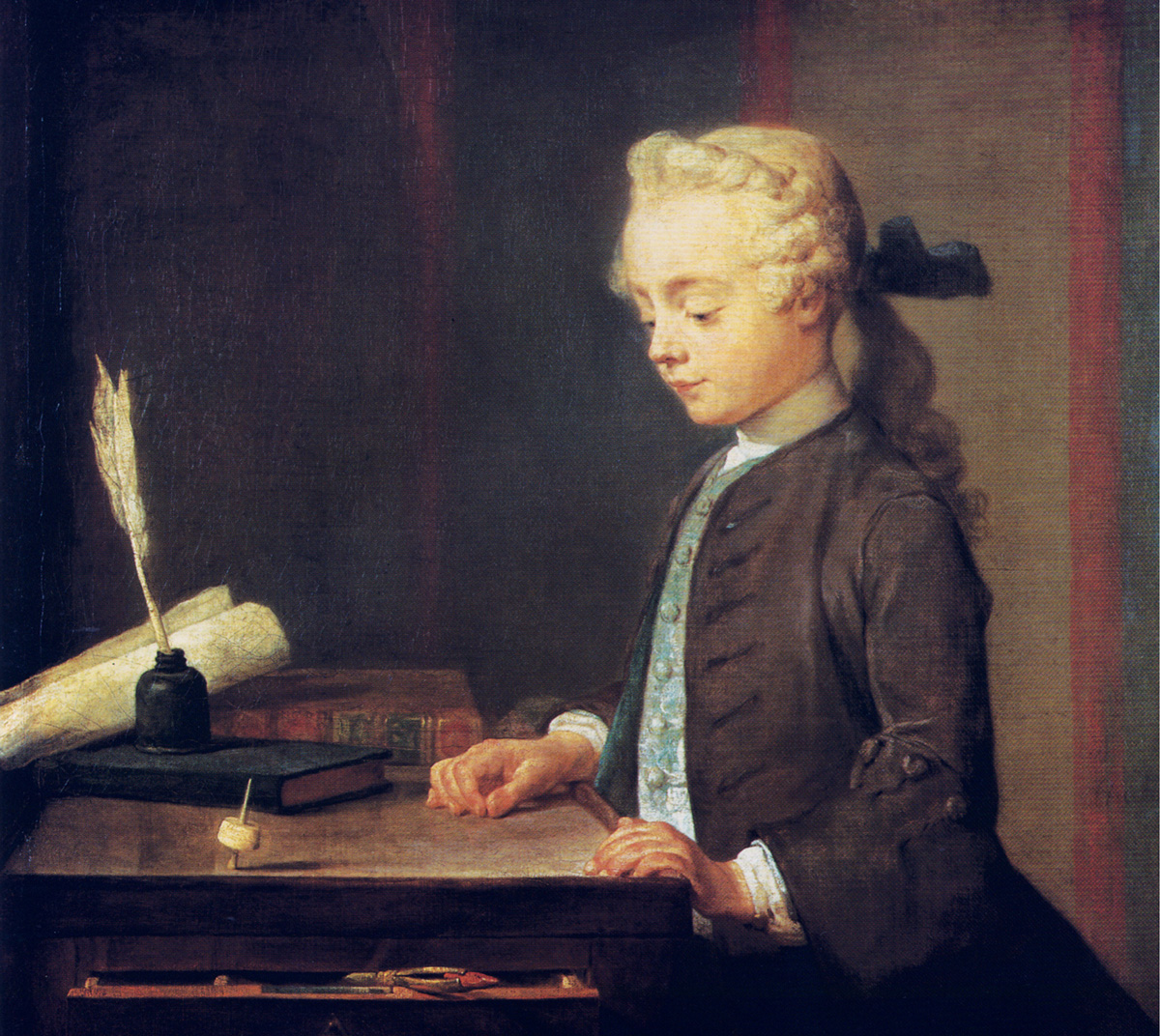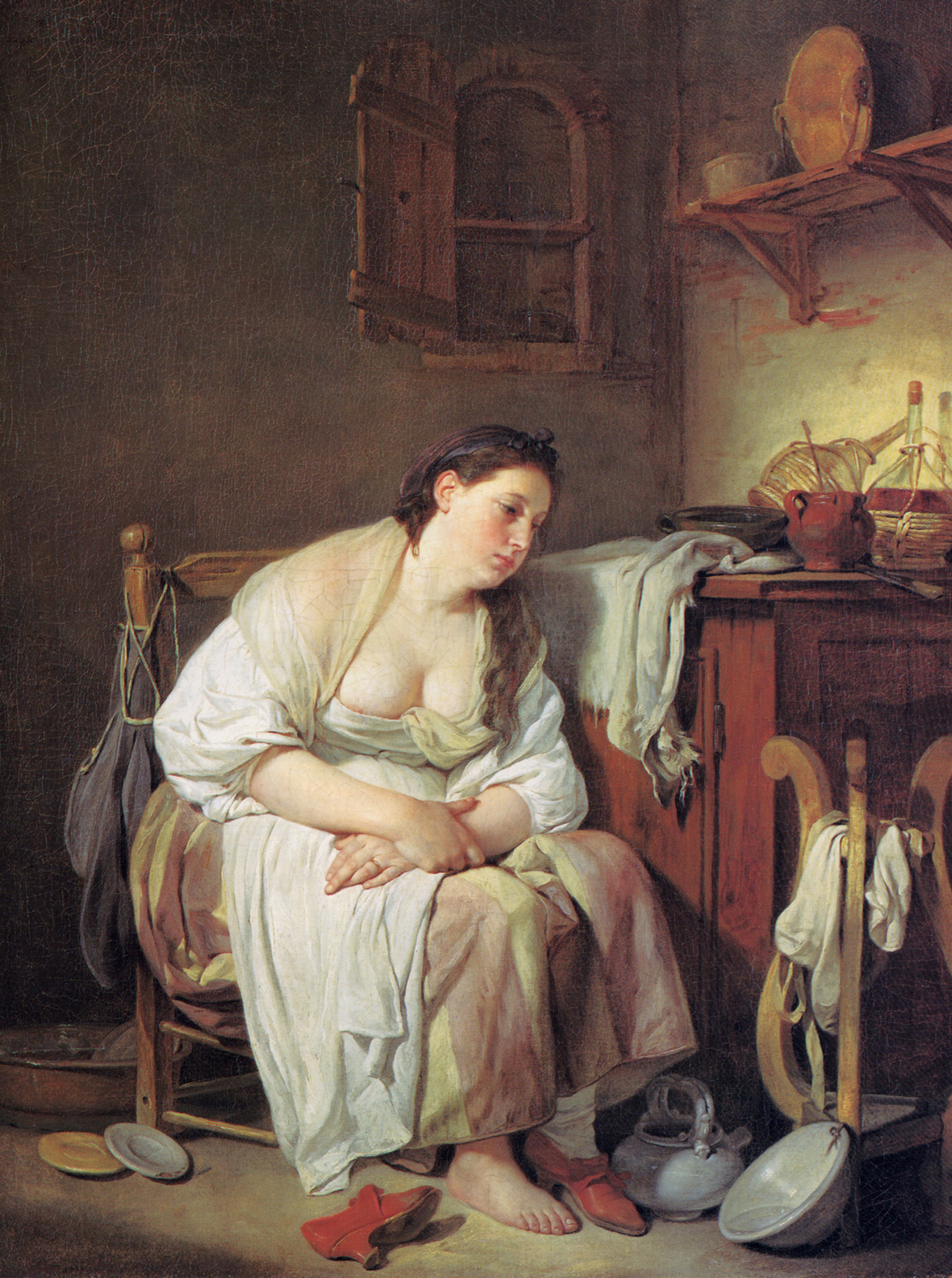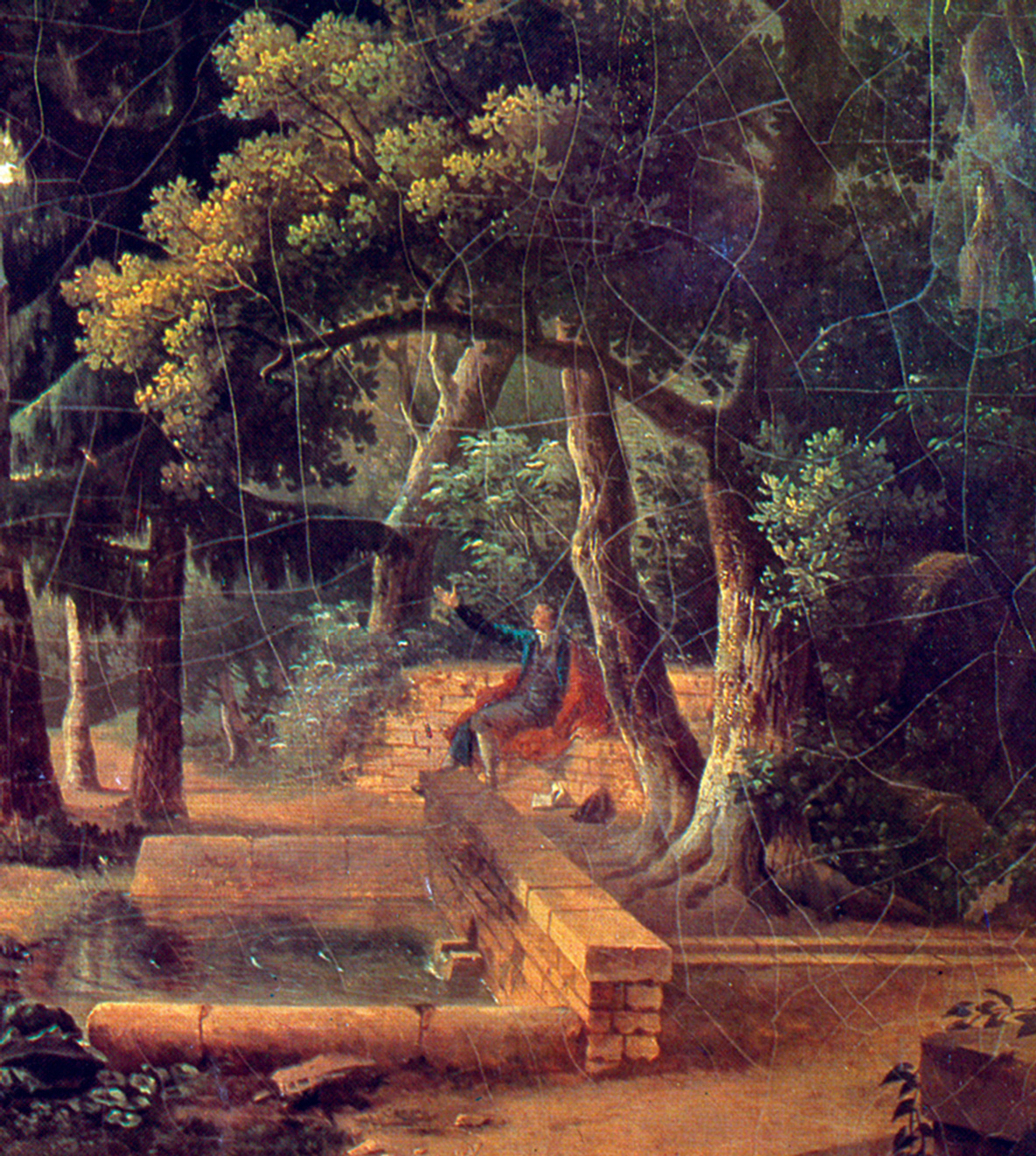Far Niente: An Interview with Pierre Saint-Amand
Laziness and the enlightenment
Sina Najafi and Pierre Saint-Amand

The roots of our contemporary obsession with work and productivity are usually traced to the eighteenth century, when the new social and philosophical project of the Enlightenment, founded on rationality, dovetailed with the emergence of a capitalist economic system based on maximizing efficiency and productivity. This is the century in which the secular gospel of work in its modern form was written. In its most radical articulation, this gospel proposes that freedom and work are in fact equivalent.
In his new book, Paresse des Lumiéres (Editions du Seuil, 2008; forthcoming in English as The Pursuit of Laziness: Idle Philosophy and the Enlightenment), Pierre Saint-Amand, professor in the departments of French studies and comparative literature at Brown University, looks to the eighteenth century paradoxically not for a critique of laziness but instead for a counter-tradition that champions it. In figures as diverse as Denis Diderot, Jean-Jacques Rousseau, Jean-Siméon Chardin, and Pierre Marivaux, he finds the beginnings of a refusal to participate in a social project governed by the work ethic and of a skepticism toward the notion that productivity and industry should be our ultimate goals. Sina Najafi spoke with Saint-Amand by phone.
Cabinet: Why did you choose the eighteenth century as the focus of a book on laziness?
Pierre Saint-Amand: The discourse against laziness really starts in a coherent way in the eighteenth century, as we reach the cusp of industrial capitalism, and as the discourses on labor and economy emerge in their rationality. That is when we see the previously marginal discourse on laziness becoming more and more pointed.
In many of the philosophers of the eighteenth century, one finds an equivalence between work and life itself. In Discourse on the Political Economy, for example, Rousseau acknowledges the inevitability of work; when he considers the responsibilities of the State and the well-being of its citizens, he argues that it’s imperative that work always be necessary and never useless. Voltaire champions the spirit of industry that pervades his century when he writes, “To work is to live.” And in his famous essay What Is Enlightenment?, Kant defines the project of the Enlightenment as having “the courage to use your own reason.” For him, laziness is associated with cowardice, which is the condition for remaining in what he calls a state of “tutelage.” For Kant, laziness is the primary obstacle to an autonomous life.
I was interested, however, in examining a counter-discourse that valorizes laziness. This counter-discourse rejects functionality, resists the ideology of utility, and affirms forms of marginality that radically unsettle the Enlightenment project. What is especially interesting is that some of the same figures in my book who promote laziness are also the ones writing apologies for work and labor.
Diderot would be one example, as would Rousseau, who begins to associate laziness with freedom in his later work, especially Reveries of the Solitary Walker. This is also the case with the painter Chardin. Many of his canvases celebrate domestic activity, but then you have the other paintings where work is suspended, and the subjects are distracted—they indulge in relaxation and even indolence. That’s basically the contradiction, the moment of dialectic, that I wanted to explore in the book. But I wanted to leave aside the question of aristocratic idleness, which is of course a given in the eighteenth century. I wanted to confront instead the particular area where laziness and idleness become figures of resistance within bourgeois economy.
Is the aristocracy exempted from critiques of laziness?
Not exactly. In religious treatises and in a lot of satire, you do see aristocrats being portrayed as lazy, as unproductive. And, of course, during the French Revolution the aristocrat will become the iconic figure of laziness. In 1789, for example, Emmanuel Sieyès formulated, in his influential What Is the Third Estate?, the revolutionary ideas of the nation, which he saw as bound by a common obligation to work. And aristocrats became “strangers” to this common project because they did not produce anything. But the aristocracy is not really affected by the context of the rising bourgeois economy and its values, which is what I’m concerned with. After all, the aristocracy is a class that is exempted from all forms of work. Leisure is an inherent privilege.
Are people like Diderot in fact reading the emerging bourgeois theories of economics and labor?
We have traces of these theories in the work of someone like Diderot, of the way the discourse of liberal economy is infiltrating the discourse of the philosopher and the encyclopedist. The historian Annie Jacob has written on the alignment between the physiocrats, who were the early economists of the eighteenth century, and the encyclopedists like Diderot. We even find in Diderot allusions to Benjamin Franklin’s writings on economy—the proto-Weberian apology for work. Franklin’s Poor Richard’s Almanack was translated very early on into French as La Science du Bonhomme Richard. When in Rameau’s Nephew —Diderot’s imaginary dialogue between a philosopher and an idler—he portrays the nephew as a parasite, as someone who lives on the margins of the market economy, he knows exactly what he’s doing.
But there is a contradiction in Diderot’s work. He certainly belongs to the category of philosophers who promote labor, who want to valorize work. But in Rameau’s Nephew, Diderot creates this unique character who is a hero of non-production—a bohemian musician who does not produce anything that lasts. Diderot shows his admiration for the genius of an artist of unfinished works, for an idler who resists economic finality and is consumed by the present, who refuses employment and subjugation. And it’s interesting that Rameau’s Nephew was written while Diderot was involved in the great busy work of his life, the Encyclopedia, for which he wrote around five thousand entries.
There are also entries in Diderot and d’Alembert’s Encyclopedia that deal with laziness.
There are several of them, and they establish a hierarchy; I focus on three. The articles were written by the Chevalier de Jaucourt, who contributed many entries to the encyclopedia. At the lowest level, there is fainéantise, literally “doing nothing,” which is described as the most physical negation of activity, a perverted escape from the obligation to work, a fault that reaches the soul. Then there is, at a more positive level, paresse, simply described as “lack of action.” And then oisiveté, “idleness,”which has more noble connotations.
Is Jaucourt drawing on an already accepted ranking of types of laziness? Or is he in fact inventing this hierarchy himself?
One can see in Jaucourt’s definitions that he speaks very much like the economists who are writing at the time, for example Anne-Robert-Jacques Turgot. Jaucourt is repeating distinctions that physiocrats like Turgot are making between various forms of economic unproductivity.
It was interesting to see that Jaucourt lionizes Hercules and his labors. I assume some of the anti-laziness discourse followed an existing Christian tradition that defined sloth as a sin. But to what extent was Classical literature mobilized?
Yes, it was interesting to see how Hercules becomes this mythological hero of work. He appears not just in Jaucourt but also, for example, in the seventeenth-century treatise Traité de la paresse (Treatise on Laziness) by Antoine de Courtin. The treatise, which continued to be influential in the eighteenth century, drew on the Christian tradition, and considered laziness essentially as what derails a virtuous, useful life. In one nice phrase, Courtin describes laziness “as a bed for the devil to lie in.” And Courtin proposed Hercules as the hero par excellence of action, as the paragon of virtue. Hercules is not only present in philosophical works, though; as Lynn Hunt shows in her work on the French Revolution, Hercules is also referenced in the French Revolution, which establishes an entire discourse valorizing work. And, of course, we find Hercules later in some fascist discourses.

One of the figures in your book is the playwright and novelist Pierre de Marivaux. He is perhaps the most important French playwright of the eighteenth century and was also quite prolific. It is surprising to see him as one of the people you turn to in your book for evidence of a counter-Enlightenment position that advocates laziness. Can you talk about this?
Despite Marivaux’s rich output, laziness is a persistent preoccupation of his in certain autobiographical fragments and in a number of his other writings. I focus on Marivaux’s output as a young man. In 1721, he launches Le Spectateur français, a French version of The Spectator, the periodical started by Addison and Steele in England in the first decade of the century. Le Spectateur was similarly part of a modern aesthetic project that represented an ideological break with the anciens, namely the attempt to put the present into prose. Marivaux becomes a painter of modern life, of “the world as it is.” He anticipates Baudelaire’s definition of modernity as “the transitory, the fugitive, the contingent,” and he wants to avoid any authorial gravity, any thinking that involves work. Instead, Marivaux’s “Spectator” becomes the scribe of circumstance, and holds himself in readiness for events as they transpire. Marivaux insists that openness to the incidental means the total absence of work. At one point, he says, “An author is a man who, in his leisure moments, is overtaken by a vague desire to think about one or several subjects; and one might call this ‘reflecting upon nothing.’” The Spectator abandons himself to the “randomness of things.”
What fascinated me about Marivaux is that he is one of those authors who portrays lazy subjects who are in fact very active at the same time. It’s this contradiction that makes them interesting—this productive un-production. The Spectator is busy, and he’s busy not being busy. His non-production comes from observing the form of an urban life that produces moments of pure circumstantiality, moments of complete inconsequence. For example, the Spectator at one point described a moment when the wind catches the powder in the hair of a bunch of elegant men. It’s these moments of volatility, pure moments of ephemerality, that Le Spectateur captures.
Are these experiences non-productive in that they don’t build on each other and offer a larger perspective?
The urban experience gives us these moments of pure futility, where the significance of events is consumed in pure epiphany. So there is nothing to build on! The observations are empty. The minute they happen, they are inconsequential. And there’s no judgment. Pure perception is the goal.
In your book, you discuss how the labor that goes into the Spectator’s busy laziness must remain invisible in order for the project to maintain itself. How does that work?
It appears like trickery, in a way. Because it doesn’t aspire to be aristocratic; it’s simply a perverse play on not giving in to the ideology of work and capital. You see this in Chardin as well. The critics of Chardin wanted him to find more noble topics for his work, which was simply genre painting and not more elevated history painting. Of course, a lot of the subjects in his paintings are also distracted or lazy. Chardin’s critics accused him of not showing his labor: they accused him of laziness, complaining that they never saw him paint! It’s true that Chardin was a slow painter, and in the eighteenth-century ideology of work, there’s a need not just to be productive but also to show labor. The realization of labor does not only come about in its products, but also in its representation.
The question of representation of labor brings up Rousseau. Can you talk about the various positions that Rousseau stakes out on laziness, political life, and the public representation of work?
Rousseau is complicated. There are a lot of shifts in his work and I didn’t want to efface them. On the contrary, I wanted to play with them and see what was going on in Rousseau’s edifice. Because, indeed, even very early on in his political writings, in the Discourses, for example, you find an apology for work. He sees work as being contiguous with citizenship, and in the famous Letter to d’Alembert on the Theater, he defines work as constitutive of the polis. Yet we see that at the end of his life he elaborates a different subjectivity, this time founded on laziness, idleness, and solitude.

The work that Marivaux refuses is a particular type of intellectual work. But Rousseau is talking about manual labor. Does he make distinctions between different kinds of work?
He does. And it’s interesting to see that when he himself withdraws from work, his criticism of work is specifically of large-scale manufacturing, which he sees as politically alienating. The work that he celebrates instead is mostly artisanal: work that can be done in solitude, doesn’t involve a major production, and doesn’t extend to a consumerist society. They are, in the end, for him, non-work. He himself hand-copied sheets of music for money. And, perhaps surprisingly, he thinks of his own work as artisanal because it satisfies all those conditions.
How does his position vis-à-vis work evolve?
In his earlier anthropological writings, there is a moment where from his description of the different states of society—agricultural, pastoral, and the more superior cultivated state of society—you see that he finds the pastoral state the most perfect. And artisanal work is in some sense a manual version of pastoral work, because in the pastoral age, you also have isolated individuals who are obviously not involved in a consumerist goal. But when Rousseau considers work in the social state, he then refuses laziness. He views it as going against the collective will, as a negative. Laziness appears only to be acceptable in the state of nature; elsewhere it is a perversion.
In his last book, Reveries of the Solitary Walker, Rousseau is very interested in the relationship between doing nothing, for which he uses the Italian phrase far niente, and working.
Reveries represents the moment when Rousseau finally abandons all apology for work. The text recreates the conditions for idleness: isolation of the individual, the forced distancing of the collective, an artificial state of nature.
One form of “work” that we do find in Reveries is botanizing. This is the sort of peculiar form of work that Rousseau will celebrate. You’re basically working with and in nature, contemplating creation, and collecting. It is the closest to the pastoral age. Botanizing in Rousseau, as he explains it in Reveries, never becomes a scientific, methodical enterprise. Rousseau basically collects plants simply for memorizing. Although Linneaus is a model who is invoked, in fact the Linnean approach is completely deconstructed in Reveries. Ultimately, Rousseau’s project is not even about naming plants. It’s about capturing the souvenir of a moment of enchantment. Walking involves the same; it is governed by the same economy of ephemerality and bliss.
Does Reveries explicitly discuss the effect of laziness on the self?
Yes, and it is at its purest in the chapters dedicated to the fifth walk and the eighth walk. There, Rousseau develops in full the subject of “worklessness,” where he finds full autonomy in doing nothing, where you have the individual who finds freedom in the act of doing nothing. In doing nothing, the self is completely “aerated.” There is an airing-out, an expulsion of external forces. It’s a little complex; you have a turning inward, yet you are also outside in nature.
Is far niente not possible in your own house? For example, if you just stayed in bed?
No, he specifically finds these epiphanies outdoors in a sort of harmonizing with nature. And he specifically critiques the cabinet of the philosopher, the philosopher’s study. He says, “My cabinet is outdoors.”
What is left of the self after you “aerate” it, after all of the external ideologies and forces that have shaped your subjectivity have been expelled? Even if doing nothing were able to accomplish this, what would be left of the subject called Rousseau? And a second question: in this moment, even if it were possible, what is left for him to think, or see, or do, or indeed write?
What is left is pure existence, pure affect. That is what, in fact, he seeks in Reveries—this peculiar moment of pure affectivity.
When Rousseau is back at his desk, does the task of writing this pure affectivity pose a dilemma for him? Is writing the experience of a fully evacuated self an issue?
Yes, it is an issue. That’s what you find in Reveries—he says that the writing traces this ephemerality, this drive toward affectivity. That’s why Reveries is written in the form of a diary. It’s a poignant irony that Rousseau’s death is inscribed in the work’s unfinished state. As he seeks repose, as he searches for this sovereign moment of worklessness, it is ironic that he encounters the most poignant form of repose—death itself. The shortest reverie is the last one. The book is unfinished; he died before completing it.
Pierre Saint-Amand is professor in the departments of French studies and comparative literature at Brown University. He is the author of several books, including The Libertine’s Progress: Seduction in the Eighteenth-Century French Novel (Brown University Press, 1994) and The Laws of Hostility: Politics, Violence, and the Enlightenment (University of Minnesota Press, 1996).
Sina Najafi is editor-in-chief of Cabinet.